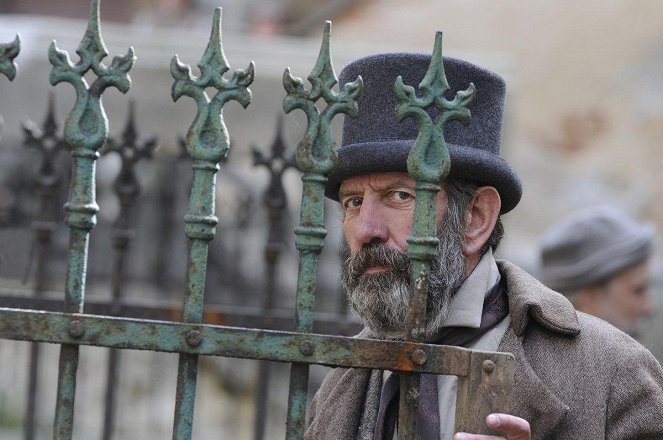Director:
Aleksandr SokúrovCámara:
Bruno DelbonnelMúsica:
Andrey SigleReparto:
Johannes Zeiler, Hanna Schygulla, Anton Adasinsky, Antoine Monot Jr., Isolda Dychauk, Georg Friedrich, Andreas Schmidt, Yuriy Arabov, Maxim Mehmet (más)Streaming (1)
Sinopsis(1)
FAUSTO, de Sokurov, no es una adaptación cinematográfica de la obra de Goethe en el sentido habitual de la palabra, sino una lectura de lo que queda entre líneas. ¿De qué color es un mundo que da a luz ideas tan colosales? ¿A qué huele? El universo de Fausto es sofocante: ideas que harán temblar el mundo nacen en el espacio reducido en el que se mueve. Es un pensador, un portavoz de ideas, un transmisor de palabras, un maquinador, un soñador. Un hombre anónimo empujado por instintos básicos: el hambre, la codicia, la lujuria. Una criatura infeliz y perseguida que plantea un reto al Fausto de Goethe. ¿Por qué contentarse con el momento si se puede ir más allá? Cada vez más allá, siempre hacia delante, sin darse cuenta de que el tiempo se ha detenido. Tú también desaparecerás. (Golem Distribución)
(más)Reseñas (2)
An interesting adaptation of the classic, which is, on one hand, historically fairly accurate in the sense that there are indeed well-crafted sets and you get a clear sense of the time period. But on the other hand, it's also a film that has its dreamlike elements and works in that regard as well. Even so, that doesn't mean I actually enjoyed it, which is reflected in my rating.
()
The greatest strength of the film is its greatest weakness: the counterpoint of matter and spirit, body and soul. The materiality of the body brilliantly intrudes into Sokurov’s otherwise typical slow flow and into lyrical classical/preromantic images. The repulsive bloated body of Mephisto amidst female purity in the beginning; Margarete’s beauty gradually ending in a shot of the vulva: the symbol of the gradual disturbance of the balance between soul and body, and the reduction of what is noble in a man (his disgust for God) to an animal (non)essence. Who introduced imbalance and Sin into the world of balance between soul and body? Who abandoned patient asceticism of knowledge, and who exchanged the promise of a constantly advancing future of science for one night with Margarete? The answer is also the answer to the question of why this typically religious interpretive framework is the film's greatest drawback: unlike Goethe's masterpiece, it completely flattens Faust's story into a Manichaean struggle between soul and matter - only Mephisto can come from the body, matter, and sex. Faust is no longer a self-destructive hero who has already achieved everything in knowledge and who joins forces with the devil to know even more, and thus he must also know what escapes science. Now he is just an impatient and defeated renegade of spiritual work, who succumbed to desire and ended up in a barren desert on his journey for bodily pleasures, which means the death of the body and the spirit. Sokurov's Days of Eclipse also took place in a desert, but the direction was the opposite: detachment from a filthy reality led upwards... here, falling away from God is inevitable. Therefore, the review must also be less.
()
Galería (39)
Foto © MFA


Anuncio